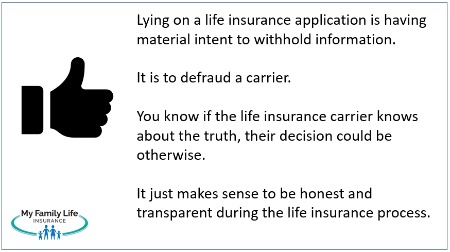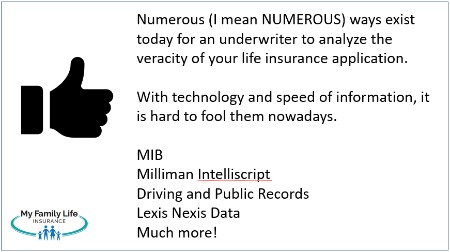3 Bad Consequences Of Lying On A Life Insurance Application
Updated: April 12, 2024 at 9:38 am
 The unfortunate truth is that people lie all the time, and many people lie on life insurance applications.
The unfortunate truth is that people lie all the time, and many people lie on life insurance applications.
How do I know? I’ve witnessed it. I’ve been doing this for a long time. I’m a CFP Professional and licensed insurance agent.
If you are applying for life insurance, I encourage you to read this article. Many other articles on this topic are written by freelancers and writers who have never worked with a client, looked a client in the eye, or sold a policy.
I have, and I will tell you the truth about lying on a life insurance application (no intentional play on the wording). I will give you details that others won’t (or can’t because they have never worked with clients).
Let me just say this: being honest and telling the truth matters here. It’s in your best interest. If you are honest and tell the truth, you will find the lowest-cost life insurance for your specific situation.
Here is what we will discuss:
- What Is Considered Lying On A Life Insurance Application?
- Why Do People Lie on Life Insurance Applications?
- You Can’t Fool Life Insurance Underwriters Anymore
- 3 Bad Consequences Of Lying On Your Life Insurance Application
- What About Simple Mistakes?
- What Happens If Your Lie Slips Through Underwriting And You Are Issued A Life Insurance Policy?
- How To Prepare For The Life Insurance Application The Right Way
- Final Thoughts
What Is Considered Lying On A Life Insurance Application?
Lying is having material intent to defraud an insurance carrier. Let me state this another way: if you know you are lying, you’ve just committed life insurance fraud. If you know something is not truthful, and state this false information on the application, that is lying, and you just committed fraud.
 That definition sounds strong. Think about this scenario. You are sitting across from a life insurance agent, filling out an application. The agent asks if you have used any tobacco or nicotine including any nicotine delivery system during the last 12 months. You vape about 1 X per week, but that’s all you do. You don’t smoke cigarettes, use chew, use hookah, etc. So, you think, “Nah, vaping isn’t considered smoking. I am not a smoker. I am not like one of those 1 or 2-pack-a-day smokers! There’s no way I am going to pay a higher rate for my life insurance!”
That definition sounds strong. Think about this scenario. You are sitting across from a life insurance agent, filling out an application. The agent asks if you have used any tobacco or nicotine including any nicotine delivery system during the last 12 months. You vape about 1 X per week, but that’s all you do. You don’t smoke cigarettes, use chew, use hookah, etc. So, you think, “Nah, vaping isn’t considered smoking. I am not a smoker. I am not like one of those 1 or 2-pack-a-day smokers! There’s no way I am going to pay a higher rate for my life insurance!”
You answer “no” and proceed with the application.
Your feelings and opinion aside, you just made a material misrepresentation on your life insurance application. (We will come back to this vaping example. Please note that if you do vape, we can still get you life insurance at non-tobacco rates – it’s true.)
In my years of helping customers obtain life insurance, lying mostly centers around your health status and health history. That’s pretty obvious since the life insurance application contains mostly health questions.
Where People Tend To Lie
People materially misrepresent in the following areas (including, but not limited to):
- tobacco use – saying when you don’t use tobacco or nicotine when you have or do
- height and weight – saying a lower weight when you know your weight is much higher
- driving record – saying no moving violations when you have had several
- felonies and criminal charges – saying you don’t when you have a misdemeanor
- mental illnesses – saying a managed or mild case, when in fact you have a severe case and disabled
- risky hobbies – saying you don’t skydive when in fact you do
The list goes on.
What Is Material Misrepresentation?
John, what do you mean by material intent or material misrepresentation?
I mean that:
- you know you are lying and
- the life insurance decision would have been different (i.e. a decline or modified) if the life insurance company knew the truth (they ultimately will – more on that later).
In other words, they would have declined the application or modified the approval (for example, apply a table rating which results in higher premiums).
Even white lies, like my vaping example above, could alter a life insurance outcome. The applicant in that example is hoping for lower non-tobacco rates when he should have higher tobacco rates.
But, John. What if I just forgot something?
Good question. That certainly does happen, and I will discuss that later.
Why Do People Lie On A Life Insurance Application?
It is simple. People lie on a life insurance application because they want a lower premium. The carrier won’t find out, they think.
They hope for a better rate and health classification.
However, making false statements can have serious consequences.
I’ll discuss those consequences later in the article.
You Can’t Fool Life Insurance Underwriters – They Know When You Lie
Twenty years ago, even 10 years ago, you could have probably fooled life insurers.
But, not anymore.
With technology, information availability, and the speed of information, it’s nearly impossible.
I know some people lie on life insurance applications, hoping to obtain a better premium and health classification. The funny thing is, though, that life insurance companies have ways of figuring out if the application information coincides with your real situation. Here’s the thing: when you apply for life insurance, you give the underwriter access to all of these databases and contact your doctor.
They can find out from the following information through the underwriting process:
- the Medical Information Bureau (now known as the MIB report)
- a prescription drug check – discloses your prescription medications taken
- your motor vehicle report
- your medical background and history – through medical records
- personal information like social media
- lexis nexis reports
- medical exam, blood sample, urine sample, and other lab work
- anything else!
Let me tell you how the life insurance application process and underwriting process work. When you complete your application and submit it to the carrier, they will start the underwriting process.
Typically, the underwriting process starts with a review of your
- MIB report,
- prescription drug history, and
- motor vehicle records
Any initial discrepancies will start here.
The MIB Group
The MIB Group (formerly the Medical Information Bureau) is the foundation of insurance underwriting. Its main purpose is to prevent life insurance application fraud. All life insurance carriers start here. Why?
Because the MIB contains your application history and how you answered past applications.
If you have applied for life insurance, disability insurance, health insurance, or long-term care insurance then you have an MIB file. The MIB encrypts and codes these answers from these applications in your MIB report.
Additionally, your MIB report includes any dates of diagnosis and treatments. Carriers can see that.
Essentially, your MIB report discloses many things about your health history.
If you are following, you can imagine that the MIB alone makes it hard for someone to fib. For example, if I answer that I don’t have high blood pressure, when in fact I do, and I’ve stated so in the past on previous applications, the life insurance underwriter will reach out to me and ask me for some clarity.
The MIB contains your information for the last 7 years. You can order your MIB report for free 1 time each year. If you are applying for life insurance, I recommend you do that so you know what is contained in your report. Personally, I order my MIB report every January. I do this to check and make sure the information contained in the report is correct.
Prescription Drug Check Through Milliman Intelliscript
Secondly, underwriters always look up your prescription drug history. They do this through Milliman Intelliscript which keeps track of your prescribed medication.
Why is the drug check important? Let’s say I take lisinopril (a typical medication for high blood pressure). However, I say “no” to the high blood pressure question. Well, my script records through Milliman say otherwise. It says that I am prescribed lisinopril. The carrier will definitely inquire why I take lisinopril.
See how that works?
Same thing with your motor vehicle records, etc.
Your Paramedical Exam, Lab Results, And Medical Records
Long ago, it was common for life insurance companies to request a paramedical exam, lab work (typically blood and urine samples), and medical records.
However, nowadays, carriers really only request these if:
- they see something that doesn’t jive with your application,
- you have a serious medical condition, or
- you apply for a high death benefit.
Moreover, they can request these anytime to confirm what is stated on the application.
Many times, underwriters order the medical records or paramedical exam when they see something that doesn’t jive on the application. That has been my personal experience.
For example, a true scenario. An applicant tells me he is 100% healthy with no health conditions (even after I ask him every which way to make sure). I remind him that the carrier will check databases.
Then, when the underwriter orders his medical records or wants a paramedical exam (when one really isn’t needed)…I know something is up.
You see, underwriters will only request these things if they need clarity and need more information. Or, if you are applying for a high death benefit amount.
Let’s say you stated on an application that you don’t smoke, but your prescription drug history sees a prescription for Chantix (which contains nicotine). The underwriter may require a blood test to confirm nicotine in your blood system and a tobacco rating.
The checks go on and on. Let’s say you have had a felony in the last 10 years, but answer “no” on the felony question. The underwriter has access to public databases. Same if you have a DUI or a bad driving history.
3 Bad Consequences Of Lying On A Life Insurance Application
What happens if you lie on a life insurance application?
The answer: it depends on the intent. But, likely the underwriter declines your application or rescinds your policy if issued.
Here are 3 bad consequences if you lie on a life insurance application. These will all impact the people who mean the most to you: your beneficiaries.
The Carrier Rescinds Your Policy
 Rescission in insurance terms means the carrier refunds all the premiums you paid and cancels your life insurance as though it never existed in the first place. This usually happens during the contestability period. Every life insurance policy issued in the US has a contestability clause. The contestability clause lasts 2 years from the start date of the policy. Essentially, this clause gives the life insurance company the ability to cancel or modify the policy. This happens when the underwriter receives information that would have changed the outcome of the decision.
Rescission in insurance terms means the carrier refunds all the premiums you paid and cancels your life insurance as though it never existed in the first place. This usually happens during the contestability period. Every life insurance policy issued in the US has a contestability clause. The contestability clause lasts 2 years from the start date of the policy. Essentially, this clause gives the life insurance company the ability to cancel or modify the policy. This happens when the underwriter receives information that would have changed the outcome of the decision.
Many writers and people believe that the contestability clause happens only on a claim. This isn’t necessarily true; I’ve seen firsthand where carriers have issued a policy, but then have rescinded it because they got doctor records or some other material information during this 2-year timeframe. This new information indicates that the applicant lied about information that occurred BEFORE the application was taken.
For example, an applicant says “no” to a question about felonies, but just had a DUI charge that didn’t show up at the time of the application. He hoped he could skate through the application process without the carrier knowing. The carrier approves him, but then it rescinds the contract when he is found guilty 3 months later.
You Could Be Sued For Fraud
Another possibility is that the life insurance company sues you for fraud. Legally, they can do that. Will they? Probably not. But, they could.
However, it will be known that you had material intent to defraud a life insurance company. It could be hard for you to secure life insurance coverage in the future.
Do you want that to happen?
You Do Pass Away And The Carrier Denies Your Family’s Death Benefit Claim
Just as bad…you do pass away during the contestability period. The carrier opens an investigation and finds out you withheld information that would have changed their decision.
They refund your beneficiaries the premiums you paid and do not pay the life insurance claim.
Do you see who you affect in all this? Your family (i.e. your beneficiaries).
What About Simple Mistakes?
Sure. We all forget things. Underwriters are going to give you the benefit of the doubt on these. Maybe you forgot when your last speeding ticket was or misjudged your weight (not grossly, though, or that would be intent to defraud). Underwriters aren’t going to hold you against this and will simply adjust the policy (if they need to).
Remember, though, if something on the above doesn’t jive with the information on the insurance application, the carrier may delay a decision until the underwriter receives more information. Depending on the situation, that can take additional weeks or months. Consequently, the underwriter could decline your application if the omitted information is material in nature.
It bears repeating: If the carrier receives material information after the fact, then it will rescind your policy. Rescind essentially means they will pay back your premiums and erase your policy from its records, like it never existed. Had underwriting had this information, they would have never issued a policy in the first place.
If Your Lie Slips Through Underwriting And Issued A Life Insurance Policy
If you can pass through the underwriting and deliberately lie on your life insurance application by omitting material information, the insurance carrier will issue a policy. But, if you are caught, the carrier voids your policy or denies a death benefit claim.
How?
As discussed, all life insurance contracts contain a two-year contestability period in which an insurance company can rescind and void the life insurance.
For example, let’s say you don’t tell the insurance company you smoke, but then in a few months you develop stage IV cancer and then you die. Most likely, the insurance company will open up an investigation and find out that you were a smoker, but did not disclose that material information.
When that happens, the insurance company probably won’t pay the death benefit. Instead, it may just refund the premiums to your beneficiaries. They will rescind your policy.
We understand there can be “gray area” questions. Some questions, you can say “yes and no”. Insurance companies understand this. As long as there was no intent to defraud and no misstatement of material fact, then you should be fine.
If there is a misstatement of age, that in itself usually does not warrant a policy termination. Therefore, the carrier will most likely adjust premiums or the death benefit.
What’s the best way to avoid all of this? Follow the old saying: honesty is the best policy. Be completely honest and open on your life insurance application answers and medical history. We know that nearly everyone has a health complication here and there. Some more than others. Even most of the agents at My Family Life Insurance have a health complication or two. Also, did you know about 5% of applicants actually receive the very best health rating class? So, don’t despair and try to lie your way through the application.
How To Prepare For A Life Insurance Application The Right Way
The moral of this article is to always tell the truth. Here at My Family Life Insurance, we can always find the lowest-cost life insurance policy for your situation.
However, there is a right way to prepare for a life insurance application. Here are my recommended steps (in no particular order):
- order your MIB report
- order your Milliman Intelliscript
- have your doctor information ready
- order your driving records (if you know you have had moving violations or accidents in the last 7 years)
- remember any surgeries or testing done the last 10 years. Make sure you write down dates, locations, reasons why, etc.
- listen to the questions carefully. Ask for clarification if you don’t understand
- just be honest, transparent, and sincere about your health history and background
The Final Word On Lying On A Life Insurance Application
There is no need. Lying will get you and your beneficiaries nowhere. Honesty is the best policy. We will always be able to find you a policy that meets your specific situation.
If you have any questions regarding any health complications or would like to know your health classification in more detail, feel free to use the form below or call, text, or email us. We would be happy to speak with you.
Learn More
Are you interested in learning more about the information in this article? Please fill out the form below, and we will email you additional information or give you a call. We always work in your best interest. By entering your information, you are providing your express consent that My Family Life Insurance may contact you via e-mails, SMS, phone calls, or prerecorded messages at any phone number(s) that you provide, even if the number is a wireless number or on any federal or state do-not-call list. Additionally, you understand that calls may be placed using automated technology, and that consent is not a requirement for purchase. Your information will NOT be sold and will remain private. However, you may opt out at any time. We respect your privacy first and foremost. By contacting us, you agree to receive text messages from our number (800) 645-9841. If you no longer wish to receive text messages, you may opt out at any time by replying "STOP".